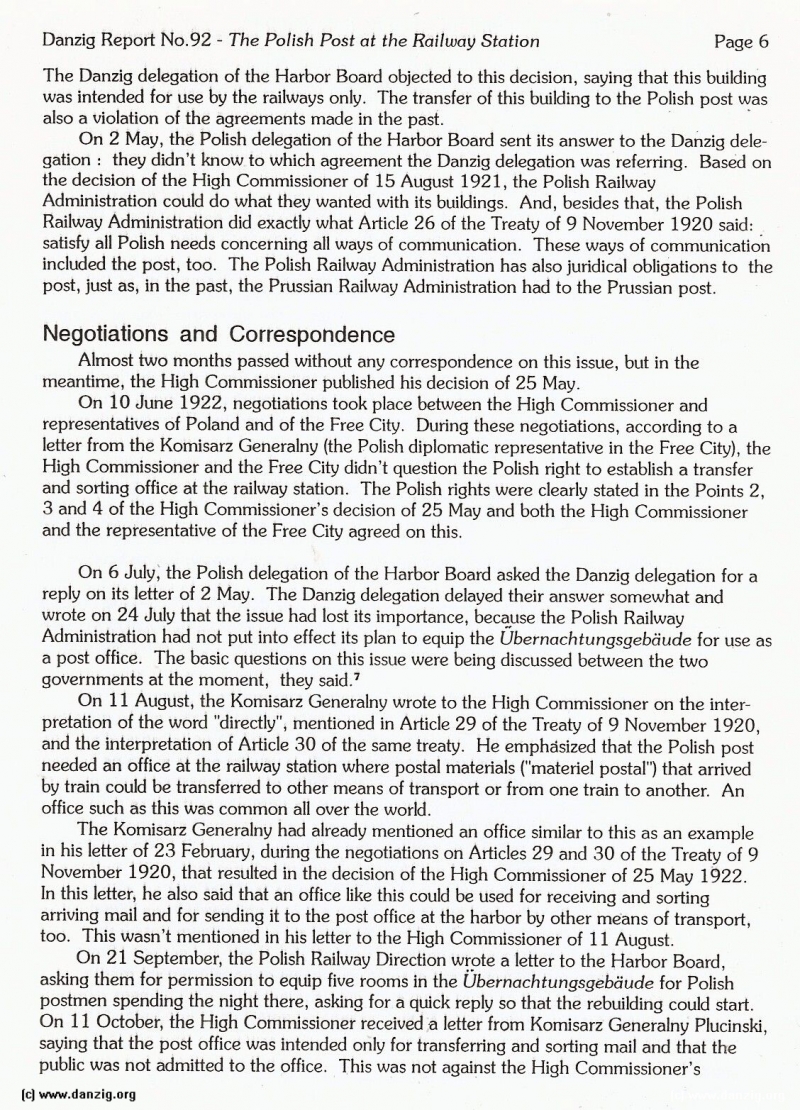
> The Polish Post office at the Railway Station in Danzig
The Danzig delegation of the Harbor Board objected to this decision, saying that this building was intended for use by the railways only. The transfer of this building to the Polish post was also a violation of the agreements made in the past.
On 2 May, the Polish delegation of the Harbor Board sent its answer to the Danzig delegation: they didn’t know to which agreement the Danzig delegation was referring. Based on the decision of the High Commissioner of 15 August 1921, the Polish Railway Administration could do what they wanted with its buildings. And, besides that, the Polish Railway Administration did exactly what Article 26 of the Treaty of 9 November 1920 said: satisfy all Polish needs concerning all ways of communication. These ways of communication included the post, too. The Polish Railway Administration has also juridical obligations to the post, just as, in the past, the Prussian Railway Administration had to the Prussian post.
Negotiations and Correspondence
Almost two months passed without any correspondence on this issue, but in the meantime, the High Commissioner published his decision of 25 May.
On 10 June 1922, negotiations took place between the High Commissioner and representatives of Poland and of the Free City. During these negotiations, according to a letter from the Komisarz Generalny (the Polish diplomatic representative in the Free City), the High Commissioner and the Free City didn’t question the Polish right to establish a transfer and sorting office at the railway station. The Polish rights were clearly stated in the Points 2, 3 and 4 of the High Commissioner’s decision of 25 May and both the High Commissioner and the representative of the Free City agreed on this.
On 6 July, the Polish delegation of the Harbor Board asked the Danzig delegation for a reply on its letter of 2 May. The Danzig delegation delayed their answer somewhat and wrote on 24 July that the issue had lost its importance, because the Polish Railway Administration had not put into effect its plan to equip the Ubernachtungsgebäude for use as a post office. The basic questions on this issue were being discussed between the two governments at the moment, they said. 7
On 11 August, the Komisarz Gerieralny wrote to the High Commissioner on the interp retation of the word “directly”, mentioned in Article 29 of the Treaty of 9 November 1920, and the interpretation of Article 30 of the same treaty. He emphasized that the Polish post needed an office at the railway station where postal materials (“materiel postal”) that arrived by train could be transferred to other means of transport or from one train to another. An office such as this was common all over the world.
The Komisarz Generalny had already mentioned an office similar to this as an example in his letter of 23 February, during the negotiations on Articles 29 and 30 of the Treaty of 9 November 1920, that resulted in the decision of the High Commissioner of 25 May 1922. In this letter, he also said that an office like this could be used for receiving and sorting arriving mail and for sending it to the post office at the harbor by other means of transport, too. This wasn’t mentioned in his letter to the High Commissioner of 11 August.
On 21 September, the Polish Railway Direction wrote a letter to the Harbor Board, asking them for permission to equip five rooms in the Ubernachtungsgebaude for Polish postmen spending the night there, asking for a quick reply so that the rebuilding could start. On 11 October, the High Commissioner received a letter from Komisarz Generalny Plucinski, saying that the post office was intended only for transferring and sorting mail and that the public was not admitted to the office. This was not against the High Commissioner’s
Danzig Report Nr. 92 - July - August - September - 1996, Page 6.
Hits: 4463
Added: 14/07/2015
Copyright: 2025 Danzig.org

